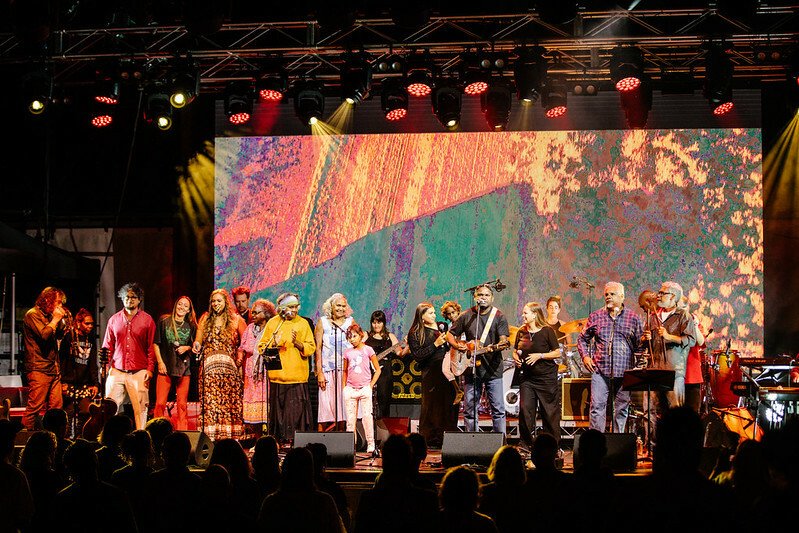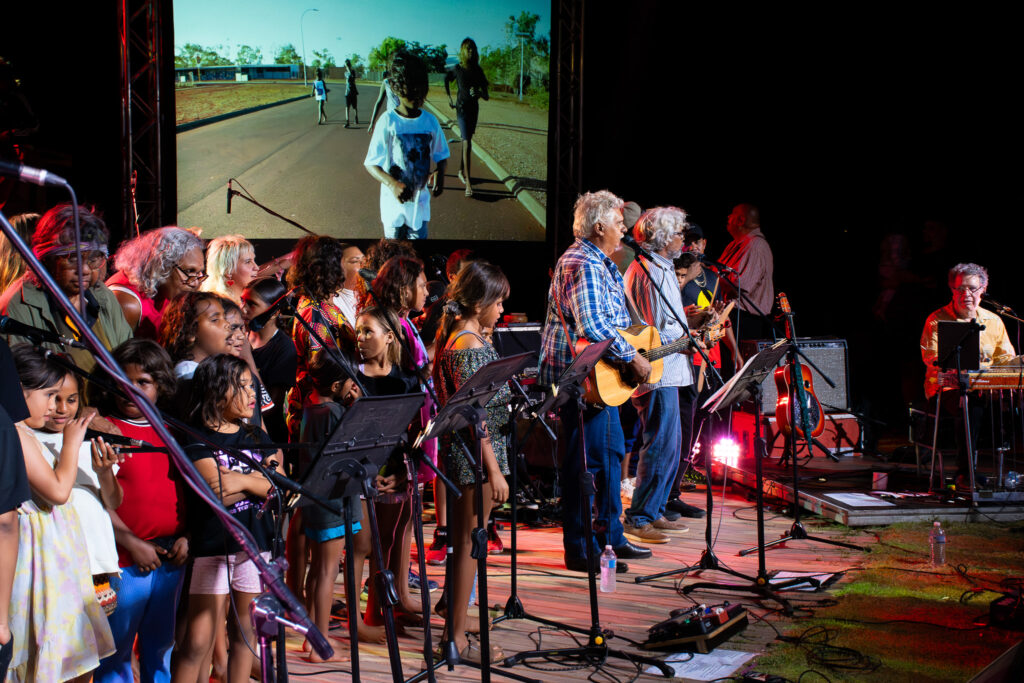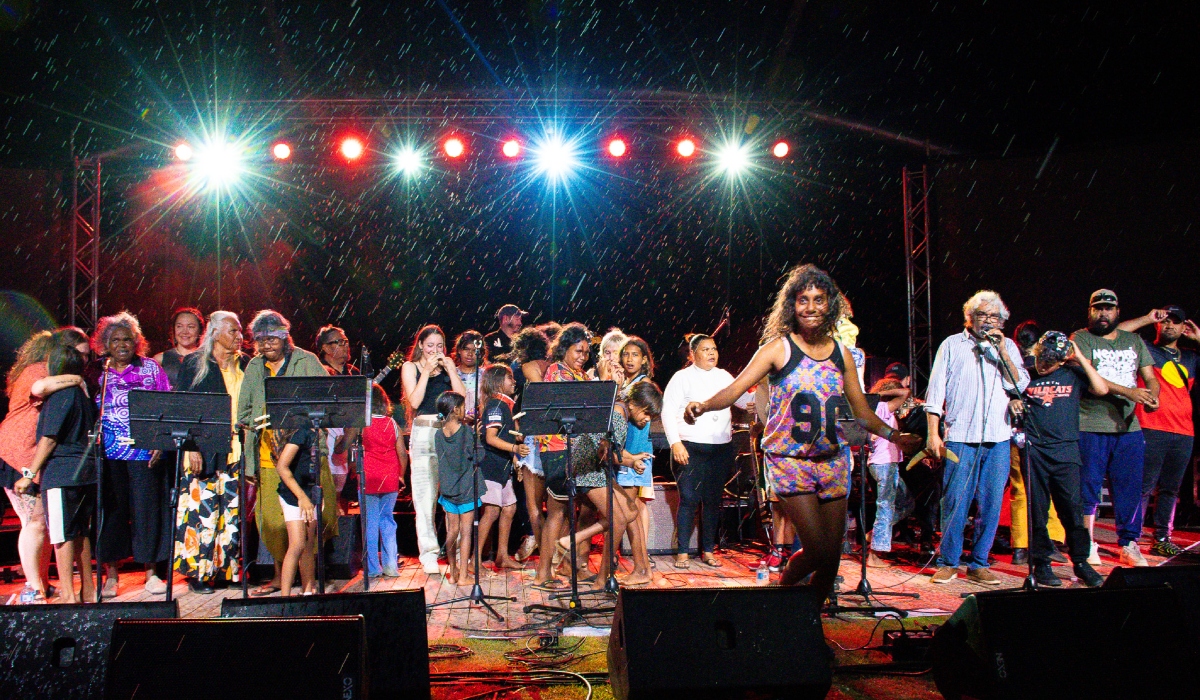Alberts and The Tony Foundation are proud to share a new evaluation case study by Big hART and Griffith University which analyses how songwriting and performance support wellbeing, community healing, and cultural justice for First Nations peoples in remote communities facing ongoing social inequity.
The new case study, How songwriting and performance support wellbeing, community, healing and cultural justice, features insights from Big hART’s Songs for Freedom project, which Alberts and The Tony Foundation has supported for the last six years.
Songs for Freedom is a powerful national project that brings together large-scale concerts, an album of music from WA’s Pilbara region, songwriting workshops, and a feature documentary. At its heart is an uplifting concert of original songs created by Ngarluma and Yindjibarndi artists – sharing the strength of the Ieramugadu (Roebourne) community, the value of their lived experience, and their thought-leadership in youth justice diversion, culture, and creativity.
The concerts feature songs written by the people of Roebourne, including those in the community and in prison, and are performed by Indigenous and non-Indigenous artists from across Australia. Delivered hand-in-hand with the community – including 100 young Indigenous people aged 9-16 from Roebourne and surrounding Pilbara communities who participated in introductory music workshops – Songs for Freedom has reached over 10,000 people and toured six cities across Australia between 2023-2024.
Its ongoing mission is to significantly reduce the number of young Aboriginal people in detention across Australia by using creative and practical ways to raise awareness and create lasting change.

The case study speaks to the power of community music and the vital role it plays in creating the conditions for self-determination, truth-telling and collective healing in remote First Nations communities experiencing the ongoing impacts of colonisation and injustice.
Key insights from the case study are reported across four interconnected areas:
-
Individual wellbeing – collaborative music-making allows participants to experience enhanced self-esteem and confidence through the expression of their identities and experiences in a supportive environment. Individuals develop valuable new skills, fostering creative freedom and critical thinking in ways that can increase their wellbeing.
-
Community healing – community songwriting and performances bring together individuals from diverse backgrounds to connect, bond, and experience a sense of collective identity and belonging. This collaborative environment empowers truth-telling through songs, providing platforms for expression and advocacy. Community music nurtures connections between different age groups, facilitating intergenerational healing through shared experiences.
-
Social consciousness – by engaging audiences in music and stories from First Nations Peoples, social consciousness is increased. Songs for Freedom serves as a platform for public education, intercultural exchange, and creative displays of resistance against oppressive socio-political structures. This process encourages strong social connections within the community as they work together to sustain their own cultural legacy and advocate for social change.
-
Cultural connections – community music plays an essential role in maintaining culture and strengthening people’s connections to Country, Elders, ancestors, and family. Through collective songwriting and performances, First Nations Peoples can expose the cultural injustice and social inequities caused by the ongoing impacts of colonisation.

“Insights from this case study form a vital part of a larger national story about the role that music plays in generating greater social equity in Australian communities,” says Professor Brydie-Leigh Bartleet, a world-leading expert in community music who led the case study in her role as project leader at the Creative Change Project at QLD’s Griffith University.
“Songs for Freedom has provided a powerful platform for truth-telling, where community members have not only sung their stories of local injustice, but also courageously advocated for wider juvenile justice reform across the whole country.”
As the creative force behind Songs for Freedom, Big hART is Australia’s leading arts and social change organisation, now in its 33rd year. It brings exceptional artists into communities to co-create powerful, authentic stories that highlight local injustices, helping to amplify these urgent stories through music, and celebrating cultural identity.
In Roebourne, Big hART works with young people to address complex challenges – including the stark reality that Aboriginal children aged 10–17 are 24 times more likely to be incarcerated than their non-Indigenous peers – while also nurturing their strengths, creativity and leadership.
Alberts, through The Tony Foundation, looks forward to continuing its ongoing support of Big hART’s impactful work, which powerfully reflects the spirit of this year’s NAIDOC Week theme: The Next Generation: Strength, Vision and Legacy.
Written as a partnership between Big hART, Roebourne community and the Creative Change Project at the Creative Arts Research Institute, and Queensland Conservatorium Griffith University, you can find the case study here.
(Images of Songs for Freedom concerts courtesy of Big hART).
